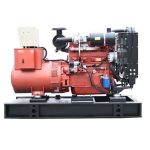Introduction:
In today's modern world, the demand for electricity is constantly increasing as new technologies emerge and populations grow. This growing demand puts significant pressure on the existing power grid infrastructure, making grid stability a critical concern for energy providers and consumers alike. One of the key tools used to maintain grid stability and ensure a reliable power supply is the diesel generator. In this article, we will explore the role of diesel generators in grid stability, their benefits, challenges, and the future outlook for this essential component of the power generation system.
The Role of Diesel Generators in Grid Stability:
Diesel generators play a vital role in maintaining grid stability by providing backup power during times of high demand or in the event of a grid failure. These generators are capable of quickly ramping up to full capacity and can be deployed at strategic locations throughout the grid to help balance supply and demand. In addition to providing backup power, diesel generators also play a crucial role in supporting the integration of renewable energy sources such as solar and wind power, which can be intermittent and unpredictable.

One of the key advantages of diesel generators is their ability to provide reliable and consistent power output, making them an essential component of the grid stability strategy. Unlike renewable energy sources that are dependent on weather conditions, diesel generators can be relied upon to deliver power whenever and wherever it is needed. This makes them particularly valuable during times of peak demand or when the grid is under stress due to unforeseen events such as natural disasters or equipment failures.
Benefits of Diesel Generators for Grid Stability:
There are several key benefits of using diesel generators for grid stability, including:
1. Reliability: Diesel generators are known for their reliability and durability, making them a dependable source of backup power during emergencies or grid failures.
2. Quick Start-Up Time: Diesel generators can be started up quickly and ramped up to full capacity within minutes, making them ideal for providing immediate power when needed.
3. Fuel Efficiency: Modern diesel generators are designed to be fuel-efficient, helping to reduce operational costs and minimize environmental impact.
4. Scalability: Diesel generators can be easily scaled up or down to meet varying power demands, making them a flexible and versatile solution for grid stability.
5. Redundancy: By deploying diesel generators at multiple locations throughout the grid, energy providers can ensure redundancy and improve overall system reliability.
Challenges of Using Diesel Generators for Grid Stability:
While diesel generators offer many benefits for grid stability, there are also some challenges associated with their use, including:
1. 600kw diesel generator for industrial applications : Diesel generators produce emissions that contribute to air pollution and climate change, raising concerns about their environmental impact.
2. Noise and Vibration: Diesel generators can be noisy and produce vibrations that may be disruptive to nearby residents or businesses, presenting challenges for siting and operation.
3. Maintenance Requirements: Diesel generators require regular maintenance to ensure optimal performance, which can be time-consuming and costly for energy providers.
4. Fuel Supply Dependence: Diesel generators rely on a steady supply of fuel, making them vulnerable to disruptions in the fuel supply chain or price fluctuations.
Future Outlook for Diesel Generators in Grid Stability:
Despite the challenges associated with their use, diesel generators are expected to continue playing a critical role in ensuring grid stability for the foreseeable future. As the demand for electricity continues to grow and the grid becomes increasingly complex, the need for reliable backup power sources will only increase. Energy providers are likely to invest in modernizing and upgrading their diesel generator fleets to improve efficiency, reduce emissions, and enhance overall system reliability.
In addition, advancements in technology, such as the integration of smart grid capabilities and energy storage systems, are expected to enhance the performance and flexibility of diesel generators in supporting grid stability. By incorporating these technologies, energy providers can optimize the operation of diesel generators, improve grid resiliency, and better integrate renewable energy sources into the power generation mix.
Conclusion:
Diesel generators are a crucial component of grid stability, providing reliable backup power, supporting the integration of renewable energy sources, and helping to balance supply and demand on the grid. While there are challenges associated with their use, such as environmental impact and maintenance requirements, diesel generators offer numerous benefits that make them an essential tool for ensuring a reliable power supply. As technology continues to evolve and the grid becomes more complex, diesel generators are expected to play an increasingly important role in maintaining grid stability and meeting the growing demand for electricity.
